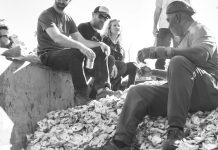
Photograph by Andrew Thomas Lee
At lunchtime, two days before Hurricane Irma’s 35-mile-per-hour winds would slam into Atlanta and leave 1.5 million Georgians without power, He Ro isn’t concerned about his apartment in Clarkston. “There’s not a lot to lose,” he says of his meager possessions, picking arugula leaves out of his chicken sandwich and eating them, one by one, before pecking at the rest.
He’s less relaxed when the conversation turns to how Kimball House might fare in the storm. The Decatur restaurant is where the 24-year-old spends much of his time, shucking around 400 oysters per night for customers who come for the smart selection of Chelsea Gems from Eld Inlet, Rappahannocks from Virginia, or Puffer’s Petites from Massachusetts.
Born in Burma, He Ro is Karen, an ethnic minority that has faced brutal hardships at the hands of the Myanmar army. His given name is actually Hero, “but when you come to America, they want you to have a first name and last name,” he says, so he split it in two. He has worked at what the restaurant’s staff members lovingly call “Kimmy” since it opened. In its four years, Kimball House has become one of the Atlanta area’s best restaurants as well as a staging ground for a new kind of Southern cool. He Ro could watch the stylish clientele through the window of his five-by-three-foot workspace, but he’s focused on ice, towels, mignonette, and, of course, oysters. His stance is athletic—left foot forward, legs slightly bent—and he dips his left shoulder closer to the table every time he homes in on a craggy opponent. There are minimal flicks of his knife, multiple wipe-downs and scrape-aways, and then, a dozen seemingly untouched oysters on the half shell, set in a circle on a steel tray. “He doesn’t go for speed,” says manager Kiran Patel. “It’s all about precision and cleanliness.”

Photograph by Andrew Thomas Lee

Photograph by Andrew Thomas Lee
Anne Seymour, who formerly worked at the nonprofit Fugees Family, helped He Ro land the job interview at Kimball House. She’s known him since he arrived in Clarkston as a shy 15-year-old who had spent much of his life in a Karen refugee camp in Thailand after fleeing Burma as a child. “It was probably the least volume of spoken word in the history of interviews,” says restaurant co-owner Bryan Rackley. “But we needed someone to shuck oysters.” He Ro had never seen one before.
“My answers were not good at all,” He Ro admits of that first meeting with Rackley. “But then he asked if I was a hard worker, and I said yes, and that was it. I wrote down the word ‘oyster,’ and I took it to the Fugees Family. They Googled it to show me what it was.” Three weeks later, despite pressure from He Ro’s father to get a job at the same chicken processing plant where he works, Rackley was showing He Ro how to open an oyster.
“He put a blade through his hand on his first day of training,” Rackley says. (He Ro confirms: “There was blood everywhere.”) “But it didn’t take too long before he was better than me. Now he’s better than everyone.” He Ro says it took him six months of near-obsessive practice to become that way, but he still doesn’t like to eat the product of his work. “It has that smell that I don’t like, and I can taste too much salt,” he says. “But if you put it in the fryer, I can eat it all night long.”

Photograph by Andrew Thomas Lee
One year into the job, when Seymour helped He Ro fill out his tax forms, she asked what to list as his profession. Restaurant worker? “No, put shucker,” he said. Seymour questioned whether the government would understand what that meant. But, she says, “He just replied, ‘I want you to put shucker as my profession.’ So I did.” Now, his name is on Kimball House’s menu (“Oysters by He Ro”), and he has made himself so valuable to Rackley that he is salaried with full benefits and has Saturdays and Sundays off.
He Ro’s saved his money, buying himself a forest green Toyota Camry and adding some friends onto his Verizon cell phone plan. “If any of the Karen kids gets in trouble, or if anyone can’t call a family member, then He Ro’s their call,” Seymour says. He’s guarded when it comes to talking about what life in the refugee camp was like. “If you follow the rules, it’s not really bad,” he says. “But the Burmese want to destroy us completely. It’s not something I want to think about. It brings anger.” His younger brother, Eh Blay, lives with him, and his mother and two other siblings live in Indiana. He goes to church on Sundays and otherwise spends much of his time listening to preachers as well as country music on YouTube. “I like that the songs are slow, and I can hear every word they’re saying. And I like love songs.” While he spends his days in a restaurant known for its first-rate cocktail program, He Ro doesn’t drink alcohol. He’s tasted it a couple times, but any more than that isn’t really sanctioned by his read of the Christian Bible.
At a Kimball House staff appreciation party at Argosy, Patel marveled at He Ro’s Skee-Ball skills. “Any sort of game, he can dial in,” Patel says. “At the end of the night, after the rest of us had drunk too much beer, we started to call an Uber, but He Ro insisted on driving us home. He almost got mad at us when we protested. ‘No, I want to take you home.’ But you will get a little judgment for drinking!”
Asked if he’s made friends at Kimball House, He Ro says, “A friend is someone you hang out with, right? Yeah, we go out and eat together sometimes—but they drink a lot,” he says, smiling. “They all love me, though.”
This article originally appeared in our December 2017 issue.













